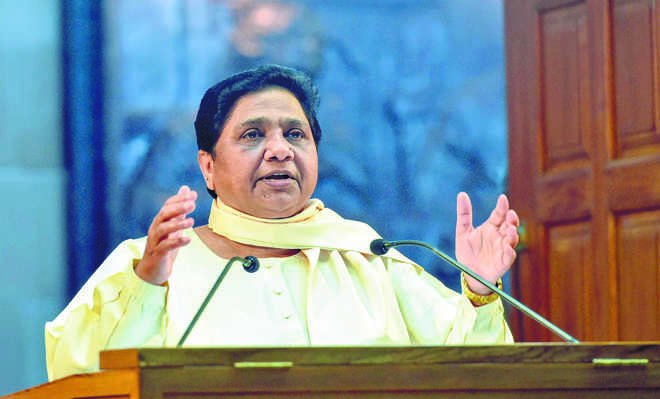
Clout: Mayawati’s Bahujan Samaj Party carries the aura of being the true-blue Dalit party.
Radhika Ramaseshan
Senior journalist
AS another new year dawned, Mayawati scored her first ‘tactical’ win in years. She used her legislative ‘strength’ in the 230-strong Madhya Pradesh Assembly to browbeat the ruling Congress and accede to a demand she raised once she offered support to the Kamal Nath government that was short by exactly two members — the number the Bahujan Samaj Party (BSP) has. Invariably, Mayawati’s clout was disproportionate to her party’s numerical weight, but her intrinsic worth as the country’s most influential Dalit leader is such that the Congress and the BJP dare not undervalue her.
The pressure point was The Scheduled Castes and Tribes (Prevention of Atrocities) Act, 1989 — the SC/ST Act in short. It is as much an article of faith for the BSP as the Constitution itself and a tender spot for most other parties, especially the Congress and the BJP. Mayawati demanded that the nascent government drop the cases that were slapped against ‘innocents’ during the Bharat bandh that Dalit and tribal organisations had called in April 2018 or face withdrawal of support. The Chief Minister promptly acquiesced and said he would recommend to the court to close the bandh-related and similar cases filed by the then Shivraj Singh Chouhan government. In obliging Mayawati, Kamal Nath probably went against his grain. In the run-up to the Assembly elections, he, too, faced the wrath of the upper castes along with the BJP leaders when the Congress endorsed the Centre’s move in Parliament to restore the original provisions of the Act which the Supreme Court sought to dilute.
Act of contention
In March 2018, the apex court ruled that the police cannot arrest anybody under the Act just because a case was filed. The ruling was based on an affidavit from the Centre that was in line with the court’s stand. The two stances caused an outcry among the Dalits and Adivasis across the country. Under pressure, the Centre abjured its earlier view and introduced amendments, restoring the original provisions to circumvent the court’s order. The Lok Sabha unanimously adopted the amendments. In its first form, the Act did not provide for anticipatory bail to an accused and ruled out a preliminary inquiry before registering a criminal case, both of which the court had watered down.
Stung by the Centre’s flip-flop, MP’s sizeable upper castes banded themselves into a protest outfit that morphed into a political party called the Samanya Picchada Alpasankhyak Adhikari Karamchari Sanstha (SAPAKS). The outfit contested the polls. It did not win seats, but sliced away the BJP’s upper caste/upper class urban votes.
What pushed the Congress to bend before Mayawati? First, to convey that she must become part of the proposed mahagathbandhan or grand alliance that remains a job half done because the parties the Congress desperately sought, such as the BSP, Samajwadi Party and the Trinamool Congress, have stayed away so far. Unless these big leaguers come in, the kernel of a coalition, ‘grand’ or otherwise, will be weak.
The country over, the BSP carries the aura of being the true-blue Dalit party. Before the Chhattisgarh polls, Mayawati slighted the Congress and joined hands with Ajit Jogi’s party. Although the combine hardly dented the Congress base, the party felt Mayawati could have brought value to the table in MP, Rajasthan and Chhattisgarh. Second, the BSP’s six legislators are critical in keeping the minority government in Rajasthan afloat. The Congress fell two short of a majority. If the BSP pulls out, the four Independents will be its main source of sustenance. Third, in Uttar Pradesh, the Congress badly needs to be under the SP-BSP umbrella to become even a little relevant and go beyond winning just Raebareli and Amethi, the Gandhis’ pocket borough.
Courting upper castes
The MP episode is as much a word to the wise in the Congress as those in the SP and Ajit Singh’s Rashtriya Lok Dal (RLD). The SC/ST Act continues to be a red rag to north India’s upper castes. Remember, when Mayawati was voted with a majority in UP in 2007, she relegated the Act to the background while courting the upper castes, which she successfully managed. Once in power, one of her first decisions was to mitigate its provisions. She had rules inserted to ensure that no ‘innocent’ person must be framed and if a fake case was called out, the offender must be penalised under Section 182 of the IPC. Her government said action must not be taken based on a complaint and arrests should be made only after an accused was found prima facie guilty following an initial investigation.
By the end of her tenure, she had packed the police stations with her handpicked men who allegedly used the Act with ‘impunity’. While the veracity of the allegations against the cops were never fully nailed, the Act’s ‘abuse’ was flagged as a major issue by the SP’s Akhilesh Yadav in the 2012 elections to win over the upper castes — which he did.
How the UP coalition itself contains and resolves its inner contradictions will run as a major narrative in the prelude to the Lok Sabha elections. Arithmetic alone cannot underwrite success. On the ground, doubtless the SP-BSP-RLD alliance, tenuous as it was, walked away with wins in the recent Uttar Pradesh byelections. On a larger canvas, the question of these parties being able to mutually transfer their votes remains unanswered. Electoral history shows that Mayawati can ensure the migration of the Dalit votes to other parties. Whether the others can is up in the air. The SP’s core Yadav supporters and the RLD’s Jats have been traditionally adversarial towards the Dalits. Having said that, caste equations are also fairly fluid and not necessarily frozen in prejudice and time.



























